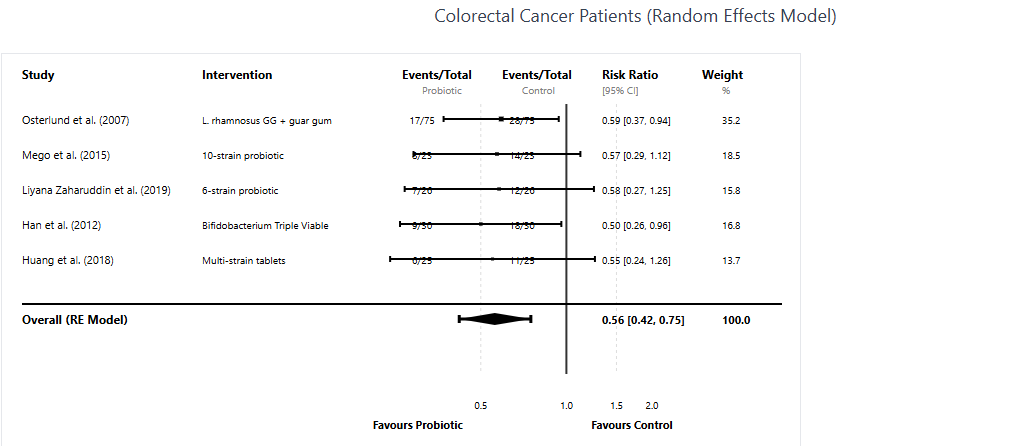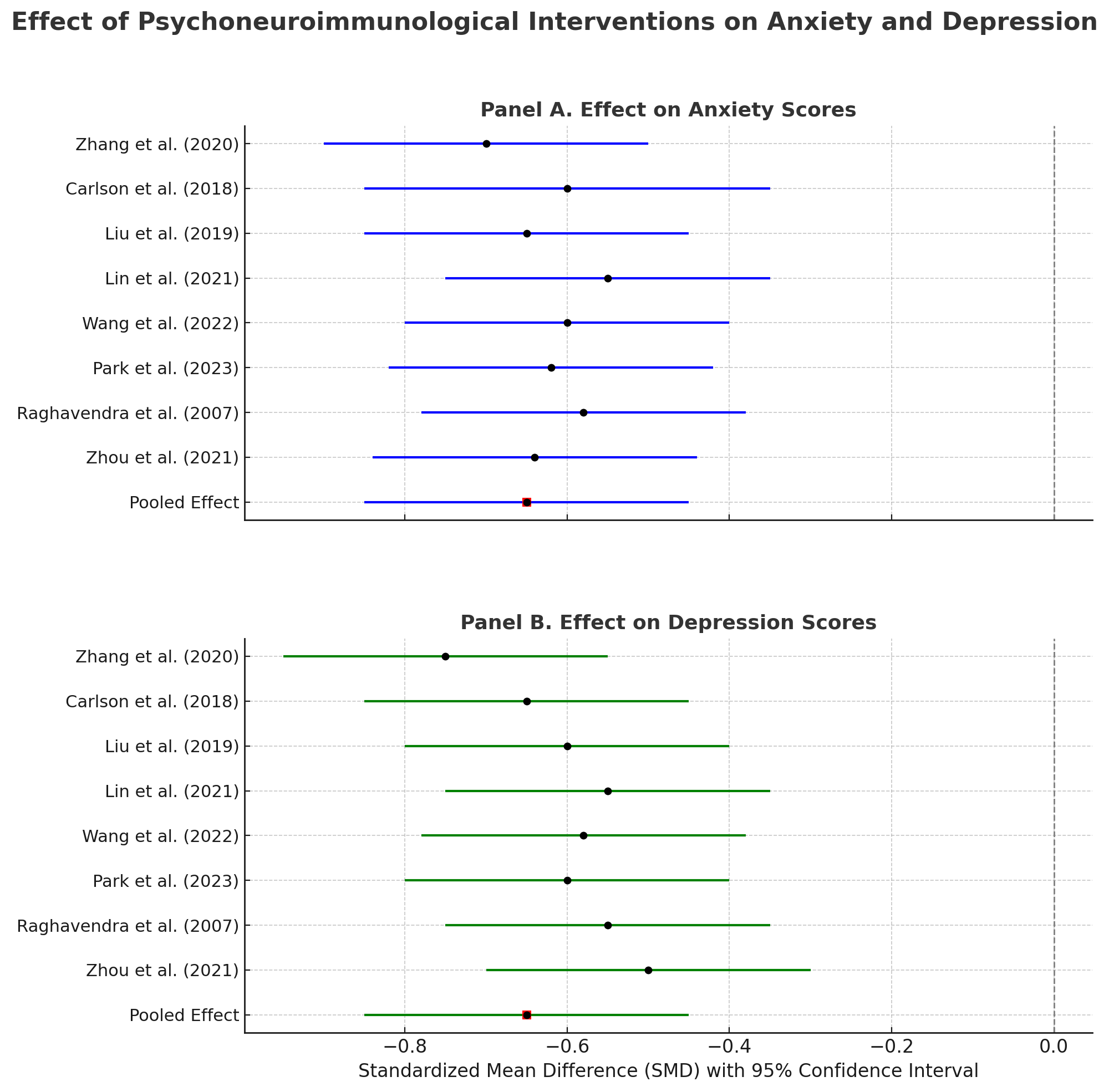Tuesday Poster Session
Category: Infections and Microbiome
P5569 - The Interplay of Psychoneuroimmunology and Gut Microbiota Modulation in Colorectal Cancer Treatment: A Systematic Review of Probiotic Interventions and Chemotherapy/Immunotherapy Outcomes
Tuesday, October 28, 2025
10:30 AM - 4:00 PM PDT
Location: Exhibit Hall
- MK
Meghana Kakarla, MD
Infirmary Health
Mobile, AL
Presenting Author(s)
Ashvath Pillai, 1, Meghana Kakarla, MD2, Giovannie Isaac-Coss, MD3, Muhammad Ali Khan, MBBS4, Nilay Bhatt, MD5, Gurmanleen Singh. Sohi, MBBS6
1SSPM Medical College and Lifetime Hospital, Navi Mumbai, Maharashtra, India; 2Infirmary Health, Mobile, AL; 3Rush University Medical Center, Chicago, IL; 4Mayo Clinic, Phoenix, AZ; 5HCA Houston Clear Lake, Houston, TX; 6Government Medical College,Patiala, Patiala, Punjab, India
Introduction: Colorectal cancers(CRC) found to be complicated by chemotherapy-induced GI toxicity, systemic inflammation, and psychological distress can be managed by targeting the psychoneuroimmunological (PNI) axis and the gut microbiota. This systematic review and meta-analysis attempt to evaluate the effects of probiotics/synbiotics and PNI-based interventions (e.g., mindfulness, cognitive behavioral therapy, yoga) on outcomes in CRC.
Methods: Following PRISMA 2020 guidelines, we thoroughly searched PubMed, Scopus, and Web of Science databases from 2007-2023 for randomized controlled trials (RCTs) focusing on probiotics, synbiotics, or psychosocial interventions in adults with CRC. Our main outcomes were chemotherapy-induced GI toxicity,alongwith anxiety and depression-related impacts. We looked into quality of life (QoL), inflammatory biomarkers like IL-6, CRP and NK cell activity as secondary outcomes. To evaluate the risk of bias, we employed the Cochrane RoB 2 tool. For the meta-analysis, we utilized a random-effects model and assessed heterogeneity through I² statistics.
Results: 18 RCTs (n=1029) were included: 9 on probiotic/synbiotic interventions (n≈248) and 9 on PNI interventions (n=781).
Probiotic/Synbiotic Meta-Analysis:
Significantly reduced risk of grade ≥3 diarrhea as per NCI classification (RR=0.56; 95% CI: 0.42–0.75; p=0.003). QoL improvements and reduced abdominal symptoms noted in 3 studies. One study showed decreased inflammatory markers (IL-6, TNF-α)
PNI Intervention Meta-Analysis:
Reduced scores of anxiety (SMD = -0.72; 95% CI: -0.96 to -0.49; p< 0.001)
Reduced depression scores (SMD = -0.68; 95% CI: -0.91 to -0.45; p< 0.001)
Improved QoL in four studies. Biomarker improvements (↓CRP, ↑NK cells, ↓cortisol) in 3 studies
Heterogeneity ranged from low to moderate (I² = 35%–58%). No major adverse events were reported for either intervention category.
Discussion: PNI-based and probiotic/synbiotic interventions showed significant improvement in psychological symptoms,while reducing GI toxicity, and modulating inflammation in patients with Colorectal cancer which support their integration into comprehensive cancer care. Future studies could focus on standardization protocols,biomarker personalization,and their potential in enhancing response to therapy.

Figure: Forest Plot for Probiotic Intervention on Chemotherapy- Induced Diarrhea

Figure: Forest Plots Depicting the Effect of Psychoneuroimmunological (PNI) Interventions on Anxiety and Depression in Colorectal Cancer Patients.
Disclosures:
Ashvath Pillai indicated no relevant financial relationships.
Meghana Kakarla indicated no relevant financial relationships.
Giovannie Isaac-Coss indicated no relevant financial relationships.
Muhammad Ali Khan indicated no relevant financial relationships.
Nilay Bhatt indicated no relevant financial relationships.
Gurmanleen Sohi indicated no relevant financial relationships.
Ashvath Pillai, 1, Meghana Kakarla, MD2, Giovannie Isaac-Coss, MD3, Muhammad Ali Khan, MBBS4, Nilay Bhatt, MD5, Gurmanleen Singh. Sohi, MBBS6. P5569 - The Interplay of Psychoneuroimmunology and Gut Microbiota Modulation in Colorectal Cancer Treatment: A Systematic Review of Probiotic Interventions and Chemotherapy/Immunotherapy Outcomes, ACG 2025 Annual Scientific Meeting Abstracts. Phoenix, AZ: American College of Gastroenterology.
1SSPM Medical College and Lifetime Hospital, Navi Mumbai, Maharashtra, India; 2Infirmary Health, Mobile, AL; 3Rush University Medical Center, Chicago, IL; 4Mayo Clinic, Phoenix, AZ; 5HCA Houston Clear Lake, Houston, TX; 6Government Medical College,Patiala, Patiala, Punjab, India
Introduction: Colorectal cancers(CRC) found to be complicated by chemotherapy-induced GI toxicity, systemic inflammation, and psychological distress can be managed by targeting the psychoneuroimmunological (PNI) axis and the gut microbiota. This systematic review and meta-analysis attempt to evaluate the effects of probiotics/synbiotics and PNI-based interventions (e.g., mindfulness, cognitive behavioral therapy, yoga) on outcomes in CRC.
Methods: Following PRISMA 2020 guidelines, we thoroughly searched PubMed, Scopus, and Web of Science databases from 2007-2023 for randomized controlled trials (RCTs) focusing on probiotics, synbiotics, or psychosocial interventions in adults with CRC. Our main outcomes were chemotherapy-induced GI toxicity,alongwith anxiety and depression-related impacts. We looked into quality of life (QoL), inflammatory biomarkers like IL-6, CRP and NK cell activity as secondary outcomes. To evaluate the risk of bias, we employed the Cochrane RoB 2 tool. For the meta-analysis, we utilized a random-effects model and assessed heterogeneity through I² statistics.
Results: 18 RCTs (n=1029) were included: 9 on probiotic/synbiotic interventions (n≈248) and 9 on PNI interventions (n=781).
Probiotic/Synbiotic Meta-Analysis:
Significantly reduced risk of grade ≥3 diarrhea as per NCI classification (RR=0.56; 95% CI: 0.42–0.75; p=0.003). QoL improvements and reduced abdominal symptoms noted in 3 studies. One study showed decreased inflammatory markers (IL-6, TNF-α)
PNI Intervention Meta-Analysis:
Reduced scores of anxiety (SMD = -0.72; 95% CI: -0.96 to -0.49; p< 0.001)
Reduced depression scores (SMD = -0.68; 95% CI: -0.91 to -0.45; p< 0.001)
Improved QoL in four studies. Biomarker improvements (↓CRP, ↑NK cells, ↓cortisol) in 3 studies
Heterogeneity ranged from low to moderate (I² = 35%–58%). No major adverse events were reported for either intervention category.
Discussion: PNI-based and probiotic/synbiotic interventions showed significant improvement in psychological symptoms,while reducing GI toxicity, and modulating inflammation in patients with Colorectal cancer which support their integration into comprehensive cancer care. Future studies could focus on standardization protocols,biomarker personalization,and their potential in enhancing response to therapy.

Figure: Forest Plot for Probiotic Intervention on Chemotherapy- Induced Diarrhea

Figure: Forest Plots Depicting the Effect of Psychoneuroimmunological (PNI) Interventions on Anxiety and Depression in Colorectal Cancer Patients.
Disclosures:
Ashvath Pillai indicated no relevant financial relationships.
Meghana Kakarla indicated no relevant financial relationships.
Giovannie Isaac-Coss indicated no relevant financial relationships.
Muhammad Ali Khan indicated no relevant financial relationships.
Nilay Bhatt indicated no relevant financial relationships.
Gurmanleen Sohi indicated no relevant financial relationships.
Ashvath Pillai, 1, Meghana Kakarla, MD2, Giovannie Isaac-Coss, MD3, Muhammad Ali Khan, MBBS4, Nilay Bhatt, MD5, Gurmanleen Singh. Sohi, MBBS6. P5569 - The Interplay of Psychoneuroimmunology and Gut Microbiota Modulation in Colorectal Cancer Treatment: A Systematic Review of Probiotic Interventions and Chemotherapy/Immunotherapy Outcomes, ACG 2025 Annual Scientific Meeting Abstracts. Phoenix, AZ: American College of Gastroenterology.
